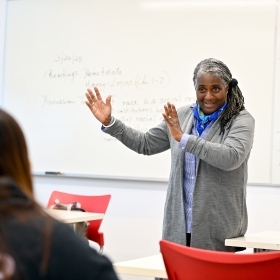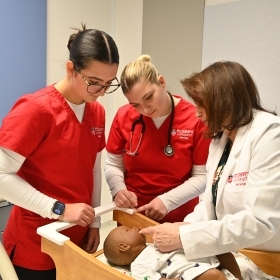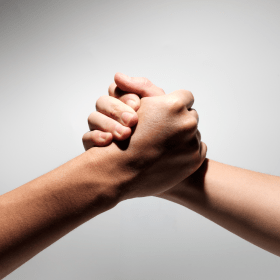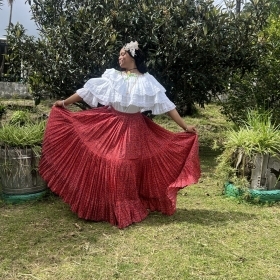What Is It Like to Be an Undergraduate Student Researcher?

At St. John’s University, students are not only encouraged to assist in research—they’re actually leading projects that shape their future careers, deepen their academic interests, and open unexpected doors.
In this Q&A blog, three undergraduate student researchers—winners at this year’s Student Research Conference—share what inspired their work, how they got started, and how research has helped them grow in and out of the classroom.
Meet the Student Researchers
David J. Anderson, Biology Major
Protein Engineering in Action
David’s research focuses on the purification and expression of recombinant Sortase A from E. coli, a process with major implications in biotech and drug development.
“I find protein engineering incredibly fascinating. Proteins are the foundation of countless biological processes and are crucial in drug discovery and biotechnology.”
Hayley Smith, Speech-Language Pathology and Audiology Major
How the Brain Hears Language
Hayley’s research uses EEG technology to uncover how the brain responds to spoken words based on our native language. This year, she explored how our brains predict what comes next in speech.
“I was inspired to explore electrophysiology due to my interest in both the linguistic features of speech and the brain's inner workings.”
Noah Dickison, Biology Major
Fertility Through Gene Editing
Noah’s research dives into the biology of fertilization—the moment life begins. Using CRISPR gene-editing tools, he studies the fertility phenotypes of a specific allele, gaining hands-on lab experience while exploring how genetics influence development.
“I wanted to get involved in research to build my laboratory and scientific inquiry skills—and to be part of something that could make a tangible impact on the world.”
Student Q&A: The Impact of Undergraduate Research
How did you get involved in research at St. John’s?
Noah: I always knew I wanted to do research—it’s my favorite part of biology. The idea of working toward a deeper understanding of the world, with the potential to contribute to society in a meaningful way, has always inspired me.
I got involved in Dr. Xue Mei's lab after researching faculty members in the biology department. We met to discuss her current work, and she later invited me to join the lab. I’ve been a part of it ever since.
Hayley: I got involved in research at St. John’s after attending a National Student Speech Language and Hearing Association (NSSLHA) club event. My faculty mentor, Dr. Monica Wagner, spoke about her research during the event, which sparked my interest.
David: I joined a research project through the First Year Research Opportunity (FYRO), offered by the Center for Student Success. I applied to projects aligned with my interests and was thrilled to be selected to join the team of Dr. Shanzhi Wang.
What’s been the most surprising or exciting part of your research journey?
Noah: The people I work with! Dr. Mei is brilliant and incredibly talented—I’m amazed by how much she knows. She’s also kind, approachable, and always willing to help.
My lab mates—Emily Mincher, Allison Ramz, Megan Magallanes, Monica Rios, and Lyna Benhamou—bring fresh ideas and different perspectives to every discussion. They motivate me to keep learning and are always there with support. The environment in our lab is warm, welcoming, and collaborative. It’s a space I truly enjoy being in.
Hayley: How it helps me gain confidence in my ability to succeed in my field. Exploring the connection between coursework and clinical practice confirmed my interest in becoming a speech-language pathologist.
David: How our lab work applies to real-world biotechnology and therapeutic development. Reading about it in textbooks is one thing, but watching it come to life through hands-on experimentation has been both eye-opening and inspiring.
How has doing research helped you grow?
Noah: Research has made me a better biologist. I’ve learned many lab techniques and procedures I previously had little experience with. It’s also helped me understand the language and terminology used in scientific settings.
Beyond technical skills, I’ve learned that research can be tedious but is deeply rewarding. It’s taught me to be patient, persistent, and collaborative—skills I’ll carry with me long after graduation.
Hayley: My lab’s research has helped me better understand course concepts. I’ve also gained perspective on the time and effort of producing research. Professionally, my mentor and lab mates have taught me how to delegate and work effectively as a team.
My communication and presentation abilities have also drastically improved. Presenting at poster sessions and panels helped me develop public-speaking strategies I’ll use in graduate school.
David: This experience has helped me grow more than I expected. Academically, I’ve applied what I’m learning in class to real research, deepening my understanding of complex biological processes.
Personally, I’ve leaned into my passion for medicine and discovered new interests in the life sciences. Professionally, working in a lab setting has given me insight into the research field and helped me build confidence in collaborative environments.
In addition to technical skills like protein purification and analysis, I’ve gained soft skills such as teamwork, problem-solving, and time management.
What advice would you give to students interested in research?
Noah: Put yourself out there. I started by browsing the St. John’s faculty page and identifying professors whose research aligned with my interests.
Yes, it can feel intimidating, but the worst-case scenario is someone says no. Rejection is part of life, and expressing your interest shows initiative. Even if a professor can’t take you on right away, they may remember you when an opening comes up.
Hayley: Don’t be afraid to email professors to ask about their research or to see if they are accepting students. That’s how I got started.
David: Even if you’re unsure whether you’ll enjoy it, research is an incredible way to learn about your interests and develop new skills. Don’t hesitate to apply or reach out—you never know what opportunities await unless you take that first step.
In One Word or Phrase: How Has Research Shaped Your College Experience?
Noah: Individualized. While many students take the same courses—especially the core curriculum—my research experience is uniquely mine. No one else is doing exactly what I’m doing, and that’s what makes it so exciting.
Hayley: There is always more to learn. Research has taught me to constantly seek new perspectives when analyzing results. This mindset extends to my entire college experience.
David: Rewarding. Research has made my college experience deeply fulfilling. It’s challenged me to think critically, introduced me to new scientific fields, and connected me with mentors and peers who share my curiosity and drive. The knowledge, growth, and confidence I’ve gained have been invaluable.
Ready to Build Your Future Through Research?
From your first year at St. John’s University, you can collaborate with faculty, pursue topics that excite you, and prepare for the future.
Explore Undergraduate Research at St. John’s University
Learn how to get started, connect with faculty, and find research programs aligned with your interests.








